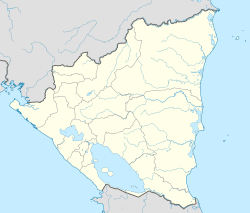San Pedro de Lóvago facts for kids
Quick facts for kids
San Pedro de Lóvago
|
|
|---|---|
|
Municipality
|
|
| Country | |
| Department | Chontales Department |
| Area | |
| • Municipality | 180 sq mi (467 km2) |
| Population
(2005)
|
|
| • Municipality | 7,650 |
| • Density | 42.43/sq mi (16.381/km2) |
| • Urban | 3,415 |
San Pedro de Lóvago is a small town in the Chontales Department of Nicaragua. It is mostly known for its farming. This area is located in the highlands, which are higher parts of central Nicaragua. It's a peaceful place where many people live and work in agriculture.
Contents
Discovering San Pedro de Lóvago
San Pedro de Lóvago is a municipality, which is like a local government area, in the Chontales Department. This department is in the central part of Nicaragua. The town itself is quite small, and many of its residents work on farms.
Where is San Pedro de Lóvago?
The town is located in the highlands of central Nicaragua. This means it's in a higher area compared to the flat coastal regions. Its exact location is around 12 degrees North latitude and 85 degrees West longitude. This position gives it a specific climate and landscape.
How big is the town?
The total area of San Pedro de Lóvago is about 467 square kilometers (about 180 square miles). To give you an idea, that's roughly the size of a medium-sized city. In 2005, about 7,650 people lived in the whole municipality. About 3,415 of these people lived in the main urban area of the town.
Life in San Pedro de Lóvago
Life in San Pedro de Lóvago is closely tied to the land. Farming is the main way people make a living here. The community is known for its quiet lifestyle and connection to nature.
What do people do there?
Most people in San Pedro de Lóvago are involved in farming. They grow crops and raise animals, which are important for feeding the local community and for trade. This type of work is common in many rural areas of Nicaragua.
What is the climate like?
Being in the highlands, San Pedro de Lóvago usually has a pleasant climate. It's often cooler than the very hot lowlands. Nicaragua has two main seasons: a rainy season and a dry season. The rainy season brings the water needed for farming.
See also
 In Spanish: San Pedro de Lóvago para niños
In Spanish: San Pedro de Lóvago para niños
 | Ernest Everett Just |
 | Mary Jackson |
 | Emmett Chappelle |
 | Marie Maynard Daly |


